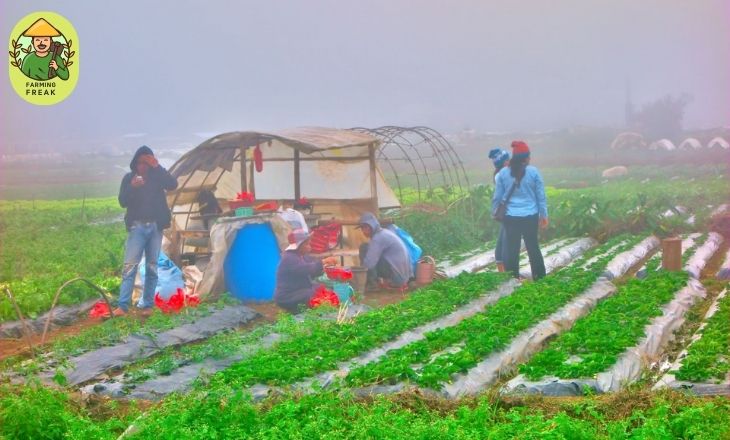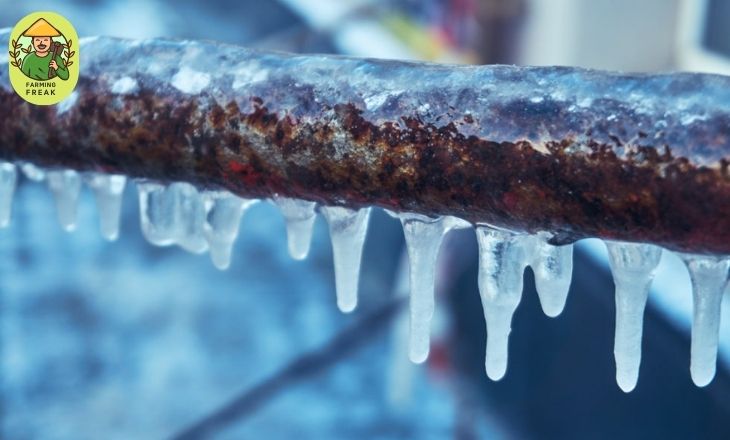As the cold winds blow and snow blankets the fields, many of us may find ourselves wondering: What do farmers do in the winter? The reality is far more fascinating than our imagination of them being kicked back by a roaring fire while sipping hot cocoa. Winter is anything but a time for rest on the farm.
From planning and preparing for next year’s crops to caring for animals and tending to essential maintenance tasks, farmers have a full plate even when temperatures drop. In this article, we will delve into this hidden world and discover just how farmers keep busy during the chilly months.
What Is Winter Farmland?
It is agricultural land that is not actively being used for planting or harvesting crops during the winter months. This land may be left fallow or used for grazing livestock. In some cases, farmers may also plant cover crops to help maintain soil health and prevent erosion during the winter.
During the winter, farmland may appear barren and dormant, but it is an important part of the agricultural cycle. Farmers use this time to prepare for the upcoming growing season by planning crop rotations, repairing equipment, and conducting soil tests.
What Do Farmers Do In The Winter?
In winter, farmers across the country take advantage of the colder weather to prepare for the upcoming season. In the small town of Hugo, Minnesota, located just 25 miles northeast of Minneapolis, Dream of Wild Health, a nonprofit organization focused on Indigenous food sovereignty, has reserved 30 acres of land to lay dormant and covered in snow.
This period becomes essential as it allows farmers to plan and strategize their activities for the next growing season. At Dream of Wild Health, they utilize this time to carefully plant cover crops on their property.
These crops serve many purposes, such as preventing erosion, enriching the soil with nutrients, and providing habitat for beneficial insects.
Keep The Farm Clean
During the winter, farmers face a unique set of challenges and responsibilities to keep their farms running smoothly. The cold weather may limit certain agricultural activities, but there is still plenty for farmers to do during this time.

A essential tasks for farmers in cold climates is clearing snow from their vehicles and equipment. This ensures that they can continue to move around the farm efficiently and safely. Shoveling sidewalks and pathways become crucial to provide easy access to various areas of the farm.
Don’t Let Water Tanks Freeze
During the winter, farmers face the challenge of ensuring their livestock has access to water despite freezing temperatures. Water tanks or troughs are essential for providing hydration to the herd, but freezing can be a major issue. To combat this, many farmers in cold climates invest in heated livestock waterers.

Different devices prevent the water from freezing by maintaining a temperature above 32 °F. It is vital for farmers to regularly check that the heated waterers are functioning properly. Just as homeowners living in drafty older houses worry about their pipes freezing, farmers too must be vigilant about preventing frozen water tanks.
Farmers understand that animals require fresh and unfrozen water at all times to maintain their health and well-being during the winter. They often devise strategies to protect their water sources from freezing solids. Some implement insulation methods, such as surrounding the tanks with hay or straw bales, to help insulate against extreme temperatures.
Take A Break From Farm Field Work
Farmers experience a much-needed break from their demanding field work during winters. As spring, summer, and fall are occupied with hours of planting, tending to, and harvesting crops, the colder season provides them with some downtime. It is during this time that they can take a breather and rejuvenate themselves for the upcoming busy seasons.
The most important task during the winter for many farmers is preparing for the next year. They use this period to carefully plan their crop rotation, selecting which crops will be sown in each field to optimize productivity and soil health. This requires studying forecasts, evaluating market demands, and considering any new techniques or technologies they can incorporate into their farming practices.
Planting Seeds For The Future
Winter is a critical time for farmers as they prepare for the upcoming growing season. Many farmers assume that winter is a time of rest, but they remain busy with various important tasks.
One essential job during this season is planning and strategizing for the next year’s crops. Farmers analyze previous years’ performance, considering factors like soil health, weather patterns, and market demands, to create an effective planting strategy.
Maintaining Machinery
The vital task during the winter is maintaining machinery. Farmers inspect and repair their equipment to ensure smooth operations when spring arrives.

This includes servicing tractors, checking irrigation systems, and repairing any worn-out or damaged parts. Farmers take this opportunity to clean out their storage areas and organize their tools in preparation for the busy months ahead.
How To Do Farming In Snow?
Farming in snow can be challenging but also rewarding. A common method is to use greenhouses or high tunnels to protect crops from the cold and snow. These structures help maintain a controlled environment for plants to thrive even in winter conditions.
Planting winter-hardy crops such as kale, spinach, and carrots can be grown in winter. As they can withstand colder temperatures and continue to grow under a blanket of snow. Covering the soil with mulch or straw can help insulate plants and protect them from frost damage.
Conclusion
It is always wondering, what do farmers do in the winter? During the winter, farmers engage in a variety of activities to ensure the success of their operations. These activities include planning for the upcoming growing season, maintaining equipment and infrastructure, caring for livestock, and exploring new opportunities for diversification.
By understanding and appreciating the work that farmers do year-round, we can better support and value their contributions to our food system.
FAQ’s
Are There Any Other Ways Farmers Generate Income During The Winter?
Yes, some farmers may offer agritourism activities such as hayrides or corn mazes, sell value-added products like homemade jams or honey, or engage in off-season farming practices like greenhouse production.
How Do Farmers Make Money In The Winter?
Farmers typically generate income by selling their harvested crops and livestock products to grocery stores and meat-packing plants.
Can Farmers Use A Chicken Tractor In Winter?
Yes, you can move chicken tractors in winter but don’t forget to cover them with a tarp to keep them warm. If you are going to leave the tractor in one place for more than a few days then the hens should be treated to some leaf bedding.
- Chicken Pecking Order: Top Secrets Of Chicken Flocks (2024) - May 26, 2024
- Top 5 Differences Between Rabbits and Hares - May 25, 2024
- 9 Edible Weeds Likely Growing in Your Yard (2024) - May 23, 2024

